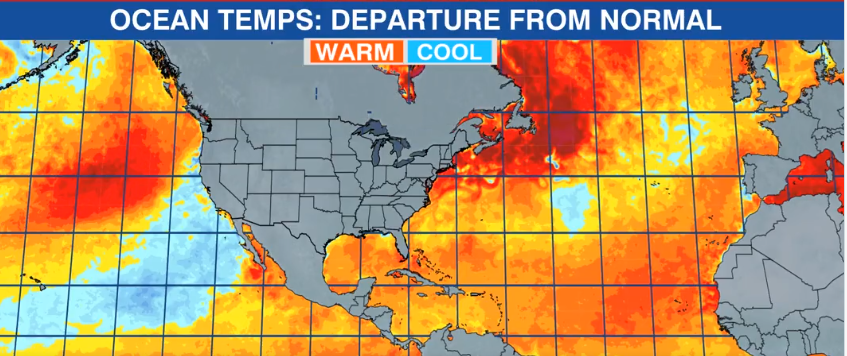
As leading climate scientists watch the devastating, breakneck speed of unfolding climate disasters unfolding across the globe – from record soaring temperatures to catastrophic flooding – many are aghast at how rapidly their worst predictions are being now being played out in real-time.
Some are also now admitting that they might well have underestimated the speed and scale of our impending climate crisis and how bad things could get.
This is deeply ironic because, for years, those scientists who sounded the alarm over climate change were attacked by the oil industry or their funded front groups for exaggerating or playing “chicken little”.
But now some of the most senior climate scientists on the planet are speaking out about their concerns.
Speaking to the BBC this morning, Professor Sir Bob Watson, who is currently Emeritus Professor of the UK’s Tyndall Centre for Climate and former chair of the Intergovernmental Panel on Climate Change, said, “I am very concerned. None of the observed changes so far (at +1.2C) are surprising. But they are more severe than we predicted. We probably underestimated the consequences.”
He added “The research community must be brutally honest. We are on a pathway to 2-3C, and probably closer to the upper end of that range. We are likely to pass 1.5C in the mid-2030’s and 2C around 2060. Current pledges and the policies needed them are totally inadequate”.
As the BBC notes although Watson’s “comments are candid on the state of action on climate change, many of his colleagues will agree with his conclusion that we are on course for a temperature rise of 2.5C or more.”
And Watson’s colleagues do concur. Ellen Thomas, a Yale University scientist who studies climate change told the Guardian “It’s not just the magnitude of change, it’s the rate of change that’s an issue.”
Thomas added: “We have highways and railroads that are set in place, our infrastructure can’t move. Almost all my colleagues have said that, in hindsight, we have underestimated the consequences. Things are moving faster than we thought, which is not good.”
Other leading scientists agree too:
1/ Here's a?on why the record shattering extremes in Europe are so unsettling for climate scientists.
It's increasingly looking that we've underestimated the impacts of #ClimateBreakdown…https://t.co/vMonwth7wP
— Dr. Aaron Thierry (@ThierryAaron) July 20, 2023
Meanwhile, others are being candid that nothing will change until we reduce our use of fossil fuels. “I’ve been expecting this for 20 years,” Professor Camille Parmesan, from the National Center for Scientific Research and an Intergovernmental Panel on Climate Change report author, told Bloomberg. “This is just going to keep happening given that we’re not reducing emissions”.
Speaking to the Guardian, James Hansen, often seen as the Godfather of climate science, warned we are hurtling towards a superheated climate because “we are damned fools” for not acting sooner. “We have to taste it to believe it.”
He told the Guardian: “There’s a lot more in the pipeline, unless we reduce the greenhouse “These superstorms are a taste of the storms of my grandchildren. We are headed wittingly into the new reality – we knew it was coming.”
“This does not mean that the extreme heat at a particular place this year will recur and grow each year. Weather fluctuations move things around. But the global average temperature will go up and the climate dice will be more and more loaded, including more extreme events.”
In a so far unpeer-reviewed scientific paper, Hansen and colleagues said: “It seems that we are headed into a new frontier of global climate,” one not seen for millions of years.
They warn: “As long as more energy is coming in than going out, we must expect global warming to continue”
Al Gore is another who is alarmed by what they are witnessing: “Everywhere you look in the world, the extremes have now seemingly reached a new level,” he told the New York Times in an interview. “The temperatures in the North Atlantic and the unprecedented decline of the Antarctic sea ice, both simultaneously. We see it in upstate New York, we see it in Vermont, we see it in southern Japan, we see it in India. We see it in the unprecedented drought in Uruguay and in Argentina.”
“The climate crisis is in the main a fossil fuel crisis,” Gore added. “If the world is not permitted to discuss the phasing down of fossil fuels because the fossil fuel companies don’t want the world to discuss it, that’s the sign of a very flawed process.”
But it’s not too late to act. As Professor Bob Watson said: “We need to hold governments to start to act sensibly now and reduce emissions”. And its not just governments. It’s the oil industry, too, as Gore points out, this is a fossil fuel crisis. Created by the fossil fuel industry. Because their decades-old public relations strategy of denying the evidence, spreading doubt and delaying action is the reason our world is on fire right now.


I am sorry to say that as long a Money is more important than People, we will continue to decline as a People. Money has become the Opiate of our time. Those who have amassed fortunes, are enthralled by their new level of influence and power. By tasting this influence and power, they acquire an insatiable need for more and more Money, no mater the cost to anyone or anything. It is the new mutation of human nature.
Just the unprejudiced opinion of a retired successful 84 year old businessman, who is educated and well traveled.
Allan Weiss
CC: Wew, Jjw, Dy